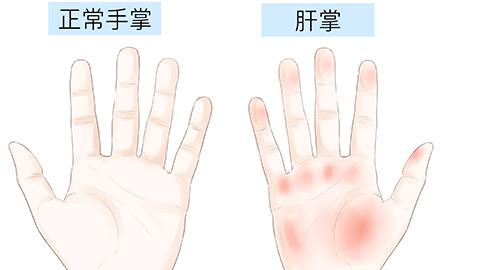What are liver palms?
Generally, liver palms may be related to factors such as changes in estrogen levels, malnutrition, chronic hepatitis, cirrhosis, and liver failure. It is recommended to seek timely medical attention, identify the underlying cause, and undergo symptomatic treatment under the guidance of a qualified physician. Detailed analysis is as follows:

1. Fluctuations in Estrogen Levels
In females, estrogen levels may change during puberty, pregnancy, or while taking contraceptive pills. An increase in estrogen may promote capillary arterial congestion and dilation, leading to the development of liver palms. It is recommended to maintain healthy lifestyle habits and avoid excessive fatigue.
2. Malnutrition
Prolonged malnutrition may lead to deficiencies of essential nutrients in the body, affecting the liver's normal metabolic function. When liver function is impaired, its ability to inactivate estrogen decreases, potentially leading to the appearance of liver palms. It is recommended to maintain a balanced diet and ensure adequate nutrient intake.
3. Chronic Hepatitis
Chronic hepatitis is usually caused by various factors such as viruses, medications, and alcohol consumption. Long-term inflammatory stimulation damages liver cells, reduces liver function, and weakens the ability to inactivate estrogen. Accumulation of estrogen in the body may cause capillary dilation in the palms, resulting in liver palms. This condition is often accompanied by symptoms such as fatigue, reduced appetite, and jaundice. Treatment typically follows medical advice using medications such as entecavir tablets, tenofovir disoproxil fumarate tablets, and compound glycyrrhizin tablets.
4. Cirrhosis
Cirrhosis is commonly caused by viral infections, genetic factors, and others. Cirrhosis leads to structural damage of the liver, severely impaired liver function, and a reduced ability to inactivate estrogen. Accumulation of estrogen in the body causes persistent capillary dilation in the palms, forming liver palms. This condition is generally accompanied by symptoms such as ascites, jaundice, and spider angiomas. Treatment may follow medical advice using medications such as sofosbuvir tablets, polyene phosphatidylcholine capsules, and diammonium glycyrrhizinate capsules.
5. Liver Failure
Liver failure is usually caused by factors such as viruses, alcohol, and medications. Liver failure leads to nearly complete loss of the liver's ability to inactivate estrogen, resulting in significant accumulation of estrogen in the body. Capillary dilation in the palms forms liver palms. Symptoms may also include coagulation disorders, infections, and hepatorenal syndrome. Treatment may involve medications such as lamivudine tablets, adefovir dipivoxil tablets, and hepatocyte growth factor injections, as advised by a physician.
It is recommended to develop good dietary habits and avoid consuming overly greasy or spicy foods, such as fatty meats, chili peppers, and ginger, to maintain liver health.








